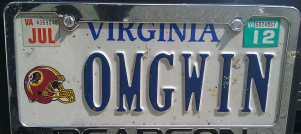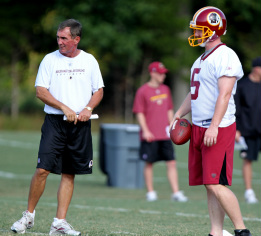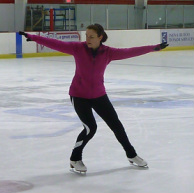 As soon as I reveal my occupation here in the DC area, I am inevitably asked, "Can you save the Redskins?" I wish it were that simple. I could just go to Redskins Park, meet with the team in their super-cool practice "bubble," flash a smile, say something magical and that would be the difference. But unfortunately, sport psychology is not magic. There is no one thing that anyone can do or say to completely transform a team in an instant. Working with a team is a process, and involves many facets. Could I ultimately save them? The good news is, I know in time I could make a difference, absolutely. How would I go about it? I have been reluctant to comment on the Redskins this season. It just seems there is so much going on beneath the surface, so much that is not being revealed, that it would be folly to attempt to say definitively what is needed and how to solve all of the issues. Having said that, here is how I see it. I see a team in turmoil, from both the top-down and the bottom-up. There is a lack of trust, a lack of team cohesion. There are egos involved; the almighty dollar and the business of it all are factors. There is a genuine and pervasive lack of respect between players and coaches, but also between players themselves. Many comments by players to the media appear laced with passive-aggression, daring us to read between the lines. It has been questioned whether there is even any talent on the team. Whether the play-calling has been sufficient. Whether players are playing to their strengths, their potential. The functioning of the team as a whole can only be considered as the sum of its parts. Each part must be in working order for the whole to achieve success. Individual efforts can be recognized and celebrated, but for a team sport, must be integrated appropriately into a team effort. Here is my plan of action: If I were able to attend practices at Redskins Park, I would look for several things. I would look for the existence of an effective practice and talent development environment. I would look for practice drills that are purposeful. The coaches would know why certain drills are useful, and this information would be relayed to the players. There would be learning, not just doing. The players would be encouraged to make decisions on the field.
I would observe the feedback coaches give. Is it well-timed, productive, effective? How do the players react to being coached? Do they encourage each other? Is there tension, or are there some light moments as well? What happens when mistakes are made? I would go to the training room, often where we find the heart of the support staff, the caregivers. Mental skills can help injured athletes rehabilitate more efficiently, and prepare them mentally to return to the field. This is vitally important to keeping them confident, motivated, and to avoid re-injury. Healthy athletes are key to consistent high-level production on the field. I would observe strength and conditioning training. Mental skills such as imagery, can produce huge increases in the training effect over physical training alone. Stronger players perform better. They are more resilient, confident. They can perform beyond their comfort zone. Much of what I do involves a lot of observation, listening, asking questions that help define issues and subsequent interventions. In talking with coaches, staff, players, yes, even Dan Snyder himself, I could formulate intentions for impact and appropriate interventions. With everyone's cooperation, commitment and dedication, we could, together, make a huge difference. So...Super Bowl win? While there can never be guarantees, the newly transformed Redskins would have one heck of a shot.
1 Comment
|
"Even if you are on the right track, you will get run over if you just sit there." Personal Best SportsThe sports world is filled with stories of perseverance, failure and success, personal struggles and public triumph. Each story provides insight into the mental side of sport and activity. Archives
March 2016
Categories
All
|


